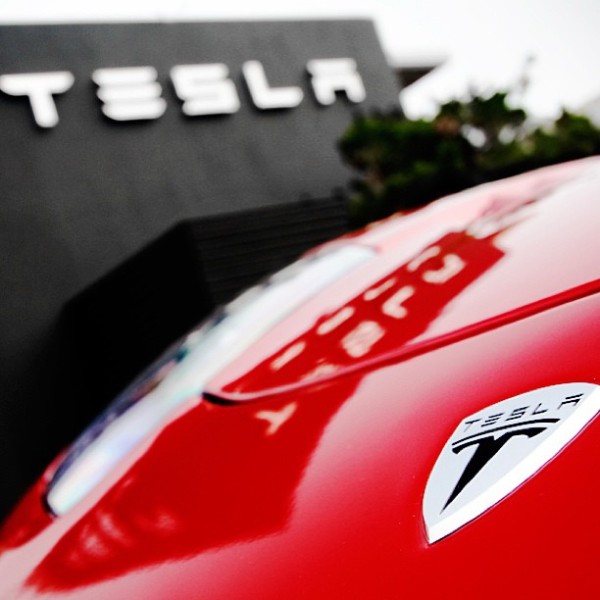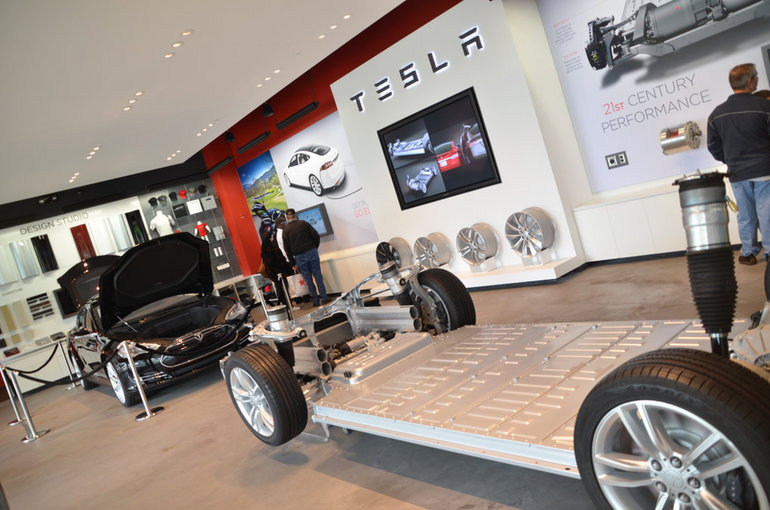News
The NJ mafia puts contract hit on Tesla


Elon Musk is always one step away from pushing the envelope further. Is calling New Jersey the mafia state enough of a wake up call?
Governor Chris Christie exemplifies modern politics clichés by turning around his previous decision legally working with Tesla Motors to follow suit with Texas and Arizona. Is there a pattern? Far from engaging in politics at Teslarati, we can’t help but wonder why those states known for their free markets ideals turned their back on the rhetoric? Where is competition and free market these days?
Does anybody remember freedom of choice?
Elon’s post rightfully reminds us of the disconnect between politicians and their constituents by saying: “the New Jersey Motor Vehicle Commission, composed of political appointees of the Governor, ended your right to purchase vehicles at a manufacturer store within the state” on his post. Governor Christie promised to put a vote to Tesla selling directly, but once the very big, and very powerful auto dealer lobby voiced their concerns, a backroom deal was cut, thus circumventing the legal process. Essentially, the auto dealer association pressures Chris Christie to force anyone buying a new vehicle through middlemen in New Jersey.
Essentially, Elon Musk accuses the Administration and the New Jersey Motor Vehicle Commission of: “going beyond their authority to implement the state’s laws at the behest of a special interest group looking to protect its monopoly at the expense of New Jersey consumers.”
Automotive Dealerships is a humongous lobby.
We’ll let you gauge how powerful the National Automotive Dealership Association is. Last year, there were 17,600 dealers of new cars and trucks in the US, yielding over $676 billion of sales, accounting for about 15 percent of all US retail activities. The automotive dealership is a substantial part of the country’s economy and its $86.8 million of dealership monies continuously spends $57 million funneled on state election across the country since 2003.
A few days back, we wrote about how the inevitable has to happen, bringing back our country to its foundation of freedom of choice. Dealerships don’t have the best reputation, and certainly very few people praise their services. Is it any wonder they push for an old, worn out self-serving business model? Tesla’s model is so modern, answers the needs of our current era and reflects a very real demand for freedom of choice. Simply put, dealerships do not offer the added services they once did, and are not able to change that quickly. Sounds familiar? Carmakers feel the same. Tesla Motors creeps under Detroit’s car manufacturers’ skin. They feel the inevitable, that change is a constant and you cannot turn around a big corporation instantly. Does that mean we don’t need car dealerships? Certainly not.
Tesla Motors is about now.
If we put everything into perspective, we find Tesla Motors answers our urgent need for elegant performance cars that run on an efficient energy means, electricity. Carmakers are left in the less enviable position of making petroleum derivative powered cars that pollute, smell bad and make awful noises. What truly isn’t fair is to expect these big carmaker and their dealerships to turn on a dime and start manufacturing batteries and electric motors. They are not tooled for this, and the investments would be gargantuan.
The Tesla stores frighten auto dealerships.
Why wouldn’t they be frightened by the Tesla stores, conveniently located inside malls, at the mercy of any onlooker? If you are relegated to the outskirts of the city, next to other car dealerships, knowing how people dread going to look for that new car, carefully maneuvering pushy salesmen, deciphering the unintelligible jargon and financing pitfalls, wouldn’t you fear Tesla? What do you do against a Tesla store that has a list of Model S drivers who will let you ride and sometimes drive their personal car? Know anyone who that with the internal combustion engine (ICE) drivers? Neither do we. But, why would you fight this marvelous system?
In the meantime, it’s hard not to feel sorry for politicians seeing constituents losing faith and car dealership lobbies facing better business models. Would you be frightened, or would you take the opportunity to change and adapt, once and for all?
News
Tesla begins Robotaxi certification push in Arizona: report
Tesla seems serious about expanding its Robotaxi service to several states in the coming months.

Tesla has initiated discussions with Arizona transportation regulators to certify its driverless Robotaxi service in the state, as per a recent report from Bloomberg News. The move follows Tesla’s launch of its Robotaxi pilot program in Austin, Texas, as well as CEO Elon Musk’s recent comments about the service’s expansion in the Bay Area.
The Arizona Department of Transportation confirmed to Bloomberg that Tesla has reached out to begin the certification process for autonomous ride-sharing operations in the state. While details remain limited, the outreach suggests that Tesla is serious about expanding its driverless Robotaxi service to several territories in the coming months.
The Arizona development comes as Tesla prepares to expand its service area in Austin this weekend, as per CEO Elon Musk in a post on X. Musk also stated that Tesla is targeting the San Francisco Bay Area as its next major market, with a potential launch “in a month or two,” pending regulatory approvals.
Tesla first launched its autonomous ride-hailing program on June 22 in Austin with a small fleet of Model Y vehicles, accompanied by a Tesla employee in the passenger seat to monitor safety. While still classified as a test, Musk has said the program will expand to about 1,000 vehicles in the coming months. Tesla will later upgrade its Robotaxi fleet with the Cyercab, a two-seater that is designed without a steering wheel.
Sightings of Cybercab castings around the Giga Texas complex suggests that Tesla may be ramping the initial trial production of the self-driving two-seater. Tesla, for its part, has noted in the past that volume production of the Cybercab is expected to start sometime next year.
In California, Tesla has already applied for a transportation charter-party carrier permit from the state’s Public Utilities Commission. The company is reportedly taking a phased approach to operating in California, with the Robotaxi service starting with pre-arranged rides for employees in vehicles with safety drivers.
News
Tesla sets November 6 date for 2025 Annual Shareholder Meeting
The automaker announced the date on Thursday in a Form 8-K.

Tesla has scheduled its 2025 annual shareholder meeting for November 6, addressing investor concerns that the company was nearing a legal deadline to hold the event.
The automaker announced the date on Thursday in a Form 8-K submitted to the United States Securities and Exchange Commission (SEC). The company also listed a new proposal submission deadline of July 31 for items to be included in the proxy statement.
Tesla’s announcement followed calls from a group of 27 shareholders, including the leaders of large public pension funds, which urged Tesla’s board to formally set the meeting date, as noted in a report from The Wall Street Journal.
The group noted that under Texas law, where Tesla is now incorporated, companies must hold annual meetings within 13 months of the last one if requested by shareholders. Tesla’s previous annual shareholder meeting was held on June 13, 2024, which placed the July 13 deadline in focus.
Tesla originally stated in its 2024 annual report that it would file its proxy statement by the end of April. However, an amended filing on April 30 indicated that the Board of Directors had not yet finalized a meeting date, at least at the time.
The April filing also confirmed that Tesla’s board had formed a special committee to evaluate certain matters related to CEO Elon Musk’s compensation plan. Musk’s CEO performance award remains at the center of a lengthy legal dispute in Delaware, Tesla’s former state of incorporation.
Due to the aftermath of Musk’s legal dispute about his compensation plan in Delaware, he has not been paid for his work at Tesla for several years. Musk, for his part, has noted that he is more concerned about his voting stake in Tesla than his actual salary.
At last year’s annual meeting, TSLA shareholders voted to reapprove Elon Musk’s compensation plan and ratified Tesla’s decision to relocate its legal domicile from Delaware to Texas.
Elon Musk
Grok coming to Tesla vehicles next week “at the latest:” Elon Musk
Grok’s rollout to Tesla vehicles is expected to begin next week at the latest.

Elon Musk announced on Thursday that Grok, the large language model developed by his startup xAI, will soon be available in Tesla vehicles. Grok’s rollout to Tesla vehicles is expected to begin next week at the latest, further deepening the ties between the two Elon Musk-led companies.
Tesla–xAI synergy
Musk confirmed the news on X shortly after livestreaming the release of Grok 4, xAI’s latest large language model. “Grok is coming to Tesla vehicles very soon. Next week at the latest,” Musk wrote in a post on social media platform X.
During the livestream, Musk and several members of the xAI team highlighted several upgrades to Grok 4’s voice capabilities and performance metrics, positioning the LLM as competitive with top-tier models from OpenAI and Google.
The in-vehicle integration of Grok marks a new chapter in Tesla’s AI development. While Tesla has long relied on in-house systems for autonomous driving and energy optimization, Grok’s integration would introduce conversational AI directly into its vehicles’ user experience. This integration could potentially improve customer interaction inside Tesla vehicles.
xAI and Tesla’s collaborative footprint
Grok’s upcoming rollout to Tesla vehicles adds to a growing business relationship between Tesla and xAI. Earlier this year, Tesla disclosed that it generated $198.3 million in revenue from commercial, consulting, and support agreements with xAI, as noted in a report from Bloomberg News. A large portion of that amount, however, came from the sale of Megapack energy storage systems to the artificial intelligence startup.
In July 2023, Musk polled X users about whether Tesla should invest $5 billion in xAI. While no formal investment has been made so far, 68% of poll participants voted yes, and Musk has since stated that the idea would be discussed with Tesla’s board.
-

 Elon Musk1 week ago
Elon Musk1 week agoTesla investors will be shocked by Jim Cramer’s latest assessment
-

 Elon Musk3 days ago
Elon Musk3 days agoElon Musk confirms Grok 4 launch on July 9 with livestream event
-

 Elon Musk15 hours ago
Elon Musk15 hours agoxAI launches Grok 4 with new $300/month SuperGrok Heavy subscription
-

 News7 days ago
News7 days agoTesla Model 3 ranks as the safest new car in Europe for 2025, per Euro NCAP tests
-

 Elon Musk2 weeks ago
Elon Musk2 weeks agoA Tesla just delivered itself to a customer autonomously, Elon Musk confirms
-

 Elon Musk1 week ago
Elon Musk1 week agoxAI’s Memphis data center receives air permit despite community criticism
-

 Elon Musk2 weeks ago
Elon Musk2 weeks agoTesla’s Omead Afshar, known as Elon Musk’s right-hand man, leaves company: reports
-

 News2 weeks ago
News2 weeks agoXiaomi CEO congratulates Tesla on first FSD delivery: “We have to continue learning!”







